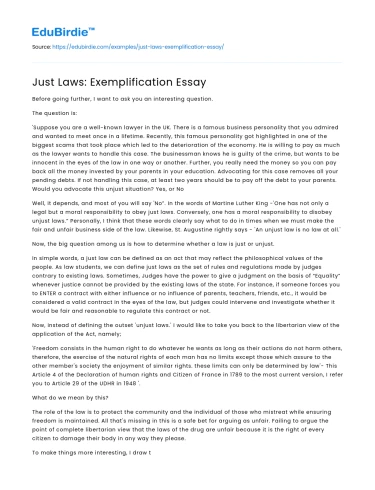Before going further, I want to ask you an interesting question.
The question is:
Save your time!
We can take care of your essay
- Proper editing and formatting
- Free revision, title page, and bibliography
- Flexible prices and money-back guarantee
'Suppose you are a well-known lawyer in the UK. There is a famous business personality that you admired and wanted to meet once in a lifetime. Recently, this famous personality got highlighted in one of the biggest scams that took place which led to the deterioration of the economy. He is willing to pay as much as the lawyer wants to handle this case. The businessman knows he is guilty of the crime, but wants to be innocent in the eyes of the law in one way or another. Further, you really need the money so you can pay back all the money invested by your parents in your education. Advocating for this case removes all your pending debts. If not handling this case, at least two years should be to pay off the debt to your parents. Would you advocate this unjust situation? Yes, or No
Well, it depends, and most of you will say 'No”. In the words of Martine Luther King -'One has not only a legal but a moral responsibility to obey just laws. Conversely, one has a moral responsibility to disobey unjust laws.” Personally, I think that these words clearly say what to do in times when we must make the fair and unfair business side of the law. Likewise, St. Augustine rightly says - 'An unjust law is no law at all.'
Now, the big question among us is how to determine whether a law is just or unjust.
In simple words, a just law can be defined as an act that may reflect the philosophical values of the people. As law students, we can define just laws as the set of rules and regulations made by judges contrary to existing laws. Sometimes, Judges have the power to give a judgment on the basis of “Equality” whenever justice cannot be provided by the existing laws of the state. For instance, if someone forces you to ENTER a contract with either influence or no influence of parents, teachers, friends, etc., it would be considered a valid contract in the eyes of the law, but judges could intervene and investigate whether it would be fair and reasonable to regulate this contract or not.
Now, instead of defining the outset 'unjust laws.' I would like to take you back to the libertarian view of the application of the Act, namely;
'Freedom consists in the human right to do whatever he wants as long as their actions do not harm others, therefore, the exercise of the natural rights of each man has no limits except those which assure to the other member's society the enjoyment of similar rights. these limits can only be determined by law'- This Article 4 of the Declaration of human rights and Citizen of France in 1789 to the most current version, I refer you to Article 29 of the UDHR in 1948 '.
What do we mean by this?
The role of the law is to protect the community and the individual of those who mistreat while ensuring freedom is maintained. All that's missing in this is a safe bet for arguing as unfair. Failing to argue the point of complete libertarian view that the laws of the drug are unfair because it is the right of every citizen to damage their body in any way they please.
To make things more interesting, I draw the writings of Martin Luther King Jr. on what he called 'just' and 'unjust' laws in its 'Prison Letter of Birmingham.' In his words 'A just law is a man-made code that squares with the moral law or the law of God. An unjust law is a code that is in harmony with the moral law'.
According to various sources, there are countless examples of unjust laws in Britain, particularly in the common law. For example, there was a time before RVG 2004 during which the rules and regulations were such that if one has committed something without realizing that is prone to a dangerous life for most people, he/she could be convicted of criminal damage ignoring the facts of the person if he was a child, had a mental illness or something like that. Do you think all this does not really seem fair?
However, after the R V. G [2004], if someone commits criminal damage under the influence of drugs or wine without achieving what he/she is doing and why he/she will not be convicted of criminal damage in accordance with the law. After reading this example, do you strongly agree or disagree on whether it was justice for the person you are damaged goods?






 Stuck on your essay?
Stuck on your essay?

